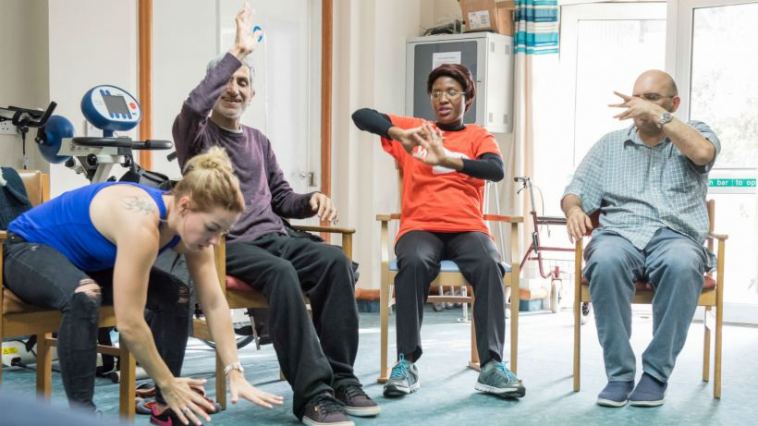- Like
- SHARE
- Digg
- Del
- Tumblr
- VKontakte
- Flattr
- Buffer
- Love This
- Save
- Odnoklassniki
- Meneame
- Blogger
- Amazon
- Yahoo Mail
- Gmail
- AOL
- Newsvine
- HackerNews
- Evernote
- MySpace
- Mail.ru
- Viadeo
- Line
- Comments
- Yummly
- SMS
- Viber
- Telegram
- JOIN
- Skype
- Facebook Messenger
- Kakao
- LiveJournal
- Yammer
- Edgar
- Fintel
- Mix
- Instapaper
- Copy Link
Introduction
Multiple sclerosis (MS) is certainly an illness that can take a lot away from you physically, mentally, emotionally, and even spiritually. And as far as the physical goes, one of those things is our precious energy.
Even fitness fanatics might find they don’t have what it takes to apply themselves to fitness as they once did, but doing so is actually one of the best things people with multiple sclerosis can do.
Although the lengths to which you exercise will obviously depend on the case and the individual, ensuring you maintain some kind of exercise in your routine can help manage symptoms and fatigue.
There’s a bit more to it, though – in this article, we take a look at what you need to know when it comes to people with MS exercising.
How Exercise Should Be Integrated Into Your Routine
It’s not difficult to see why exercise in a MS-affected state can be extraordinarily difficult due to the development of fatigue, weakness and poor co-ordination, but this can be overcome by understanding your own limits.
Knowing how much you can exercise and not bring on MS-related symptoms can help considerably in the long-term to help you manage your symptoms better. Consulting with your doctor is the best step to first take after you have decided to start properly exercising.
Your doctor will be able to give you a schedule from which you can start – generally, this might resemble a routine of 30 minutes three days a week – and this will typically not be too intense as moderation is important to not exacerbating symptoms.
Done correctly, exercise will allow you to improve your overall strength and balance, improve bowel and bladder control, and decrease MS-related spasticity. If you go overboard, however, you might experience severe fatigue and injury and exacerbate MS-related symptoms.
It might also be the case that you experience numbness, tingling or blurred vision as your body warms up through exercise, although these symptoms will disappear as your body returns to a stable temperature range.
The Kind of Exercises You Should Aim For
It’s certainly not the case that all exercise is good for people with MS – generally, the best things to aim for are aerobic exercises, stretching, and progressive strength training.
Before you get stuck into any of it, make sure to allocate some warm up time – without a bit of warming up, such as a quick walk or gentle cycle, you can do damage to your body in a variety of ways.
Aerobic exercise is the best thing to get started with, as it can very gently easy you into exercise, particularly after a recent diagnosis. Aerobic exercise will include anything that increases heart rate, such as walking, jogging, or swimming.
Strength exercise is also valuable as it can help you retain muscle mass and slowly develop strength. If you don’t have any weights, there are many body weight exercises you can incorporate to get the same result.
If you have balance-related issues, you might want to also consider exercise in a pool, as this can help prevent any instances of falling.
Precautions to Consider in Relation to Exercise
There are a few precautions people with MS should consider while exercising to ensure they don’t overdo it.
Recovery time is a good example of this – although important to any exercise routine, taking care to recover after exercise if you have MS is even more important.
This can also help you better gauge when you overdo a workout so that you can dial it back down in the future.
It’s also very important that hydration and keeping cool is also maintained, as rising body temperature can make MS symptoms much worse.
Conclusion
Being diagnosed with MS is going to add a host of new challenges into your life. This means you’re going to have to adapt to these challenges.
Thankfully, exercise has been proven to help ease multiple sclerosis symptoms. Exercise will help keep your spirits high, especially when faced with difficult times. There are going to be days where things are great and days where you feel like giving up.
With increased challenge, anything that will help ease your burden will be a welcoming addition in your life, and staying active is one of those things, even if it will require some modifications to your familiar regimen.
So for this reason, it’s imperative to stay active, but due to your new and unique challenges, it’s very important that you don’t overdo it. That is one mistake most MS sufferers make. Slow and steady wins the race when it comes to exercising with MS.
Be sure to consult with your doctor to fill him in on your exercise plans and see if he has any specific recommendations for your unique case. But at the end of the day, staying healthy and fit along your journey with MS is going to make life easier for you.
About Theresa Duncan
Originally from Detroit, MI, Theresa has been offering health and fitness advice for the last 30 years while working as an engineer. She decided to turn her passion into a profession, and finds nothing more satisfying than helping others reach their health and fitness goals.

